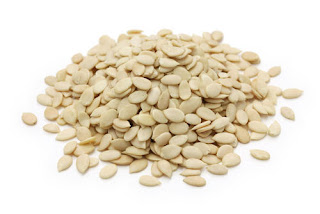Melon: What You Don't Know About The Popular Egusi Seed
In Nigeria melon seeds are used for soups and stews but what we don't know is that it has other purposes which are beneficial to our health, here are some other things you don't know about melon seed (egusi)
Culinary Purposes
Egusi is mostly grown for its shelled seeds that are usually ground and used for preparing assorted dishes such as egusi soup, egusi stew and salad. Some common Nigerian egusi dishes include; pounded yam and egusi soup, egusi and okro soup, Iyan and egusi, fufu and egusi soup, eba and egusi soup, egusi sauce and rice etc.
Anti-inflammatory Properties
Melon contains anti-inflammatory properties that help treat infections and injury.
A study reveals that the methanol extract of egusi significantly inhibited serotonin, carrageenan and prostaglandin which helps fight inflammation.
Anticancer Properties
Egusi is a good herbal cure for cancer and is best for curing breast cancer.
The results of a study by Grossman et al., (2007) showed that cucurbitacin glycosides possess pleiotropic effects on cells thus leading to both apoptosis and cell cycle arrest. Thus cucurbitacin glycosides exhibit therapeutic effects against breast cancer cells.
Anti-bacterial Properties
Test carried out on the bacterial properties of this plant showed that Citrullus colocynthis is suitable for treating ailments caused by bacteria and organisms.
Anti-arthritic Properties
Melon fruit hydroalcoholic extract possess significant anti-arthritic properties. This is attributed to its rich constituent of phytochemicals such as flavonoids. As a result, it can be used for treating rheumatoid arthritis, which is an autoimmune disease symptomized by chronic inflammation of the joints, stiffness, swelling, pain and redness in the joints. This sort of chronic inflammation tends to destroy the ligaments, cartilage and bone thereby leading to deformities in the joints.
Dermatological Purposes
The vitamin B2 (Riboflavin) and niacin in this plant help to maintain healthy skin. Oil extracted from egusi seeds can be used for producing local soap and pomade for dermatological care.
Livestock Fodder
The shells obtained during the oil extraction can be used as poultry litter. The leaves and the gourds can also serve as livestock fodders.
Treatment of Boils and Carbuncles
Boils and carbuncles are inflamed, red, painful lumps that can develop on any part of the skin., the fruit and root of the egusi plant can be mashed and mixed with water. This mixture can then be applied to boils, carbuncles and pimples.
Aids Digestion
Due to the presence of dietary fibre and vitamin B1 (Thiamine) in egusi melon, it is useful for facilitating easy digestion of food.
Boosts Appetite
It helps to boost appetite due to its constituent of vitamin B1.
Anti-diabetic Properties
Study shows that every part of the egusi melon plant namely; fruit, stem, root, leaves, oil extracts and seeds possess antidiabetic properties. This is attributed to the insulinotropic effects of the plant.
Culinary Purposes
Egusi is mostly grown for its shelled seeds that are usually ground and used for preparing assorted dishes such as egusi soup, egusi stew and salad. Some common Nigerian egusi dishes include; pounded yam and egusi soup, egusi and okro soup, Iyan and egusi, fufu and egusi soup, eba and egusi soup, egusi sauce and rice etc.
Anti-inflammatory Properties
Melon contains anti-inflammatory properties that help treat infections and injury.
A study reveals that the methanol extract of egusi significantly inhibited serotonin, carrageenan and prostaglandin which helps fight inflammation.
Anticancer Properties
Egusi is a good herbal cure for cancer and is best for curing breast cancer.
The results of a study by Grossman et al., (2007) showed that cucurbitacin glycosides possess pleiotropic effects on cells thus leading to both apoptosis and cell cycle arrest. Thus cucurbitacin glycosides exhibit therapeutic effects against breast cancer cells.
Anti-bacterial Properties
Test carried out on the bacterial properties of this plant showed that Citrullus colocynthis is suitable for treating ailments caused by bacteria and organisms.
Anti-arthritic Properties
Melon fruit hydroalcoholic extract possess significant anti-arthritic properties. This is attributed to its rich constituent of phytochemicals such as flavonoids. As a result, it can be used for treating rheumatoid arthritis, which is an autoimmune disease symptomized by chronic inflammation of the joints, stiffness, swelling, pain and redness in the joints. This sort of chronic inflammation tends to destroy the ligaments, cartilage and bone thereby leading to deformities in the joints.
Dermatological Purposes
The vitamin B2 (Riboflavin) and niacin in this plant help to maintain healthy skin. Oil extracted from egusi seeds can be used for producing local soap and pomade for dermatological care.
Livestock Fodder
The shells obtained during the oil extraction can be used as poultry litter. The leaves and the gourds can also serve as livestock fodders.
Treatment of Boils and Carbuncles
Boils and carbuncles are inflamed, red, painful lumps that can develop on any part of the skin., the fruit and root of the egusi plant can be mashed and mixed with water. This mixture can then be applied to boils, carbuncles and pimples.
Aids Digestion
Due to the presence of dietary fibre and vitamin B1 (Thiamine) in egusi melon, it is useful for facilitating easy digestion of food.
Boosts Appetite
It helps to boost appetite due to its constituent of vitamin B1.
Anti-diabetic Properties
Study shows that every part of the egusi melon plant namely; fruit, stem, root, leaves, oil extracts and seeds possess antidiabetic properties. This is attributed to the insulinotropic effects of the plant.




Comments
Post a Comment